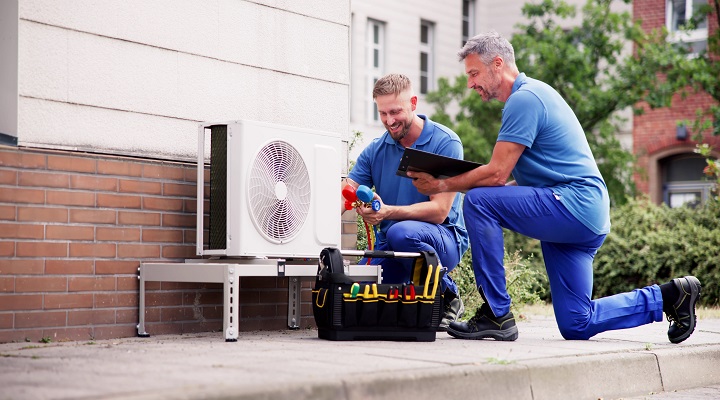There’s only one quick solution to the shortage of heat pump engineers in the UK – Inside track
4 min read
To decarbonise the UK’s housing stock, the government has committed to 600,000 heat pump installations a year by 2028. After transport, buildings are the second highest emitting sector in the country. Of all the home retrofit solutions, putting in a heat pump has the biggest impact on emissions, and it comes with the added benefits of making your home more comfortable and shielding you from high gas prices.
But only about ten per cent of this target is being achieved, with just 60,000 heat pumps being installed annually. Low consumer demand is the primary reason with many households unable to afford heat pumps, even with government subsidies. Some consumers are also put off by the fact that installation can be disruptive and cause logistical issues because heat pumps typically take up more space than a conventional boiler. Finally, a lack of policy certainty and the relatively late phase out date of 2035 for gas boilers are further discouraging businesses and consumers from jumping into the market.
We have elsewhere suggested policies that could help increase consumer demand, such as providing access to more affordable finance (e.g. means tested grants for lower income households to install heat pumps) and bringing forwards the Future Homes Standard which would incentivise more heat pumps to be installed in new builds.
Lack of engineers is pushing up prices
However, as our recent research with ODI outlines, there is another much more significant challenge. There aren’t nearly enough skilled heat pump installers which is contributing to the high installation costs and long wait times. The full effect of this problem isn’t yet being felt. But, as demand for heat pumps ramps up, domestic labour shortages will become more acute. This can be addressed in the long term with carefully targeted skills policy but, in the meantime, our report shows that the solution in the short term could be found in immigration policy.
Labour shortages are being felt across the UK economy. Construction is already acutely affected by workforce constraints, and this is predicted to get worse: the Climate Change Committee estimates 120,000 to 230,000 new jobs will be necessary to meet building decarbonisation targets by 2030. But the government has no overarching national retrofit strategy or workforce development plan to fill the vacancies.
At present, heat pump engineers can train through two routes. Existing heating engineers and plumbers can reskill relatively rapidly by taking a course; but few are opting to do so due to the high training costs, lack of customer demand and the fact that many will retire before the new requirements come into force. The other route is to train from scratch through apprenticeships and managed learning programmes, but this can take up to four years and, in many cases, requires people to train as plumbers or boiler engineers first.
Other barriers to scaling up the domestic workforce fast enough include the fact that there are very few experienced heat pump installers in the UK who can train others and a hard to navigate landscape of training options.
The UK is behind in training up the workforce
Having a domestic workforce of heat pump engineers is critical and should be the priority, but there is a lot of uncertainty whether this can be done in time to meet the decarbonisation targets. The Heating and Hotwater Industry Council has estimated that two thirds of the heat pump workforce will need to be new entrants. Training them up takes time. The UK is already far behind other countries and government delay is shortening the development timeframe even more.
In the short term, relaxing immigration policy could be the answer to flexible support for workforce development. The EU heat pump market is more mature than the UK’s and is the obvious place to source the talent to train and supervise new UK heat pump installers. But there are a number of barriers at present. The immigration system is more restrictive and costly for EU workers today than it was. Few non-EU country workers with the same skillset are readily available, though migrant gas boiler engineers and plumbers could be retrained.
In our report, produced jointly with the ODI, we propose several answers to the problem. These include creating an umbrella sponsorship model for the construction sector, to support small and medium sized construction firms in international recruitment. A new net zero workforce visa could be introduced or the skilled worker route to employment in the UK could be made less costly for green jobs. Skills mobility partnerships could be developed to create a ‘pipeline’ of construction sector workers from overseas. More refugees could be upskilled through schemes such as the Displaced Talent Mobility Pilot.
A national retrofit strategy and workforce plan are urgently needed now to establish the domestic heat pump workforce we need for wide scale heating decarbonisation across the UK. Until we have that, the skills gap should be filled by doing more to attract the skills from abroad to get us on the road to greener, more comfortable homes.





